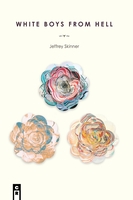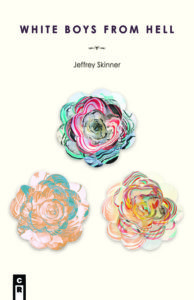~~~***2018 Winter Soup Bowl Selection***~~~

Everyone knows you don’t talk about the elephant in the room. But, what if you are the elephant in the room? White Boys from Hell files a report on the position of the straight white male in current American culture, a position fraught with contradiction and confusion. It does so without resort to the diction of the academy, or any lens applied in detachment, but, rather: from the inside out. In poems that address relations between men and women, men and other men, and men and the larger world, notions such as “masculinity,” and “toxic masculinity” are considered by the voice of poetry, which, in Robert Pinsky’s use of the phrase, means “something quite literal and practical.” Granted, these are the poems of one person (elephant?) only, but the voice is compelling, the vision clear-eyed, rending, and urgent.
 A LOOK INSIDE:
A LOOK INSIDE:
Shush
The women are calling out the men
& rightly so. I’m over here trying not to make noise.
I’m poor, the only sins I can afford
Are handmade. Mostly I watch TV. There, it’s sex
& death—dawn to dusk. It’s 3D desire in Dolby Atmos.
But, where is it not? I want
To climb in, into the confetti mass
Of electrons, to ululate among those golden mean
Faces, maybe snap one off like a virtual flower.
But mama said, You dasn’t, you dasn’t,
An imperative so whispery, so soft in the mouth
It almost seems unsounded, telepathic.
Mama’s like everyone now—
In a home, she doesn’t know where.
The saline bag’s been needled, she’s leaking out.
Anyway, it wasn’t mama who said dasn’t—
That was my German grandmother
Who died early, in a time when the terminal weren’t told.
I lug the OED to the mahogany high desk & look—
Yep, the definition of mercy has changed.
But I remember seeing her before I went to college.
She knew, it was in her eyes. I knew she knew.
HYPE
Jeffrey Skinner’s title White Boys From Hell should not be understood so much as an identity but as the location from which he speaks. As he states in “The Nighthawk,” he is going “back to warn the guy I used to be.” This collection is a series of investigations into the many shapes we see ourselves having taken in retrospect, and an even more thorough examination of the shaping influences. In the end, Skinner achieves his goal: even if the soul he drags back from the abyss is a little torn, it remains whole.
–Cate Marvin
These remarkable poems manage to sound the depths of at least two vital oceans: the present and the past. As we witness cultural shifts that empower “women [to] call out the men / and rightly so,” Skinner’s speaker undertakes a harrowing, deeply personal journey through representations of American masculinity. His investigations yield truths both toxic and sweet. In one poem, fathers appear with troubling gifts: “sidelong Irish grins” and hunting advice meant for another time. In another, the speaker’s current and former selves meet in the landscape of Hopper’s Nighthawks, but can’t connect. These poems fess up to pain–the struggle to live up to externally-imposed definitions of gendered selfhood, and the battle to extricate oneself from internalized bias. These poems show us what happens when we keep asking ourselves difficult questions: we become wilder, yes, stranger, yes, and, finally, free.
–Kiki Petrosino
